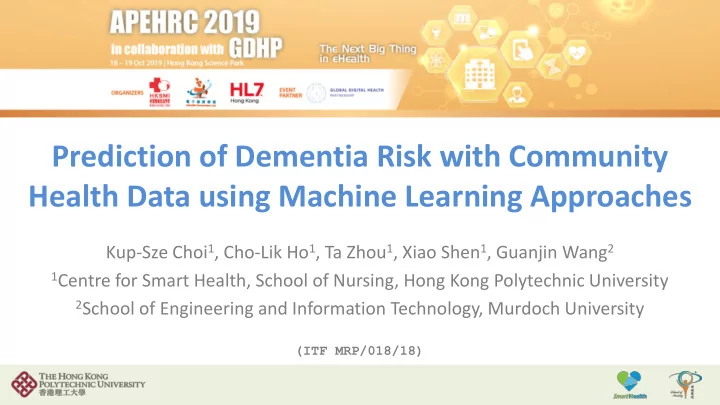

Prediction of Dementia Risk with Community Health Data using Machine Learning Approaches Kup-Sze Choi 1 , Cho-Lik Ho 1 , Ta Zhou 1 , Xiao Shen 1 , Guanjin Wang 2 1 Centre for Smart Health, School of Nursing, Hong Kong Polytechnic University 2 School of Engineering and Information Technology, Murdoch University (ITF MRP/018/18)
2 Background • Despite being a global health problem, people with dementia are largely unnoticed , while early detection of dementia is important for timely diagnosis and intervention. • Other than hospital-based data which usually record information of dementia at a later stage, community health data in primary care settings has the potential to render signs or hints of dementia to alert healthcare providers and the elderly.
3 The study • The machine learning techniques of k-nearest neighbours ( KNN ) and support vector machine ( SVM ) were applied to community health profile to classify between normal versus non-normal cases .
4 Methods • Data – A set of health data of 298 community-dwelling elderly people, collected during primary healthcare services in different districts of Hong Kong from 2008 to 2018
5 Methods • Features – Demographic information – Bio-measurements – Data collected with questionnaires on mobility, nutrition assessment, depression assessment, happiness assessment, pain assessment, etc. – Total: 217 features
6 Methods • Model training – Scores of mini-mental state examination (MMSE) as benchmark for model output – Normal: 24 – 30 points – Not normal: 0 – 23 points – Normalization to [0,1] – Training-to-testing ratio: 7: 3
7 Results • Results after 100 runs Model Accuracy kNN 0.81 ± 0.033 SVM 0.67 ± 0.046
8 Discussion • Machine learning algorithms can be applied to community health profile to predict dementia risk • Advanced algorithms will be explored to improve classification performance. • As the data are collected in primary care settings, the proposed approach has the potential to detect dementia at early stage.
9 Discussion • Nevertheless, the issue of data imbalance with the dataset may affect the performance since the proportion of the cases of normal cognition is larger. • Future work will be conducted to counteract the issue with appropriate computational algorithms.
10 Acknowledgement • This work was supported by the Innovation Technology Fund, under the Midstream Research Program for Universities (Project No. MRP/018/18)
Recommend
More recommend